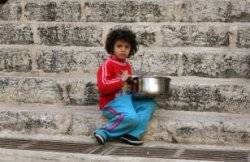Israeli "segregation policies" have caused deep economic isolation and left more than 80 percent of Palestian children in east Jerusalem wallowing in poverty, the UN said in a report.
"Palestinian poverty in Jerusalem has risen steadily over the last decade," the UN Conference on Trade and Development (UNCTAD) said in a statement on Thursday.
A full 82 percent of Palestinian children in east Jerusalem lived in poverty in 2010, a figure that fell to 45 percent of Israeli children in the same area, according to the organization.
The findings echoed a report issued by an Israeli human rights group earlier this week lamenting that the city's Palestinian residents were suffering the "worst (poverty) rate of all time."
The soaring poverty levels among Palestinians were closely linked to the city's increasing economic isolation, UNCTAD said, maintaining that "segregation policies" including the building of Israeli separation barrier had left it "integrated neither into the Palestinian economy nor into the Israeli economy."
Israel insists the barrier is needed for security reasons, but it has met broad international condemnation for carving off large segments of the West Bank, splitting families, separating farmers from their land and slicing east Jerusalem off from their hoped-for future state.
Discriminatory policies
The barrier has caused direct losses to east Jerusalem's economy of more than $1.0 billion, the UNCTAD report said, adding that the wall continues to cost the city's economy around $200 million a year in lost trade and employment opportunities.
The report authors pointed out that isolation alone did not explain the spread of poverty among Palestinians in east Jerusalem, pointing to discriminatory policies and the different legal status of the city's Palestinian dwellers compared to Israeli settlers there and other Palestinians.
This "implies a host of further impediments, especially with regard to housing, employment, taxation," the report said, pointing out by way of example that Palestinians there "pay high municipal taxes in return for poor services and disproportionately low public expenditures."
UNCTAD chastised Israel for not doing enough to meet its obligations as an occupying power, urging the country to act "with vigor to improve economic conditions in east Jerusalem and the well-being of Palestinian residents."
It also called for an end to "settlement activities and the occupation of east Jerusalem in line with United Nations resolutions."
Israel captured the Arab eastern part of Jerusalem during the 1967 Six-Day War and later annexed it in a move that has never been recognized by the international community.
PHOTO CAPTION
A Palestinian girl holds an empty pot as she waits to receive rice and meat soup at the Hasseki Sultan Imaret soup-chicken, a project by the Waqf (religious endowment) to provide basic nutritional food for people in need in Jerusalem's Old City on January 31, 2010.
Aljazeera


 Home
Home Discover Islam
Discover Islam Quran Recitations
Quran Recitations Lectures
Lectures
 Fatwa
Fatwa Articles
Articles Fiqh
Fiqh E-Books
E-Books Boys & Girls
Boys & Girls  Hajj Rulings
Hajj Rulings Hajj Fatwas
Hajj Fatwas














